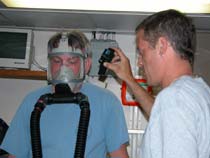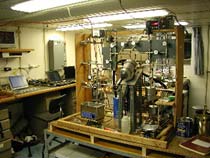|
|
|||||||||||||||||||||||||||||||||||||||||||||||||||||||||||||||||||||||||||||||||||||||||||||||||
 |
|||||||||||||||||||||||||||||||||||||||||||||||||||||||||||||||||||||||||||||||||||||||||||||||||
|
On The Way To Lost City
This morning started as I expect most mornings on this cruise will start: by missing breakfast. As breakfast is served between 0730 and 0815 it would be a struggle to get me out of my bunk considering I normally work all night. However, on previous voyages on the Atlantis I have grown to love cook Luscious Larry's breakfast, and have been known to watch a 5 am movie to stay up until I can get a specially made egg muffin. Regardless, I did make it up for the 0900 safety meeting (check out the picture of Eric Olson testing out an emergency breathing apparatus for use in Alvin), and then slowly returned to work preparing the seagoing lab for sample extraction.
I am all settled into my corner of the ship, located in the forward, starboard section of the main lab. Located in the foreground is the extraction line that Eric Olson and I use to extract all the gases dissolved in fluids sampled with a special device called a "gas-tight cylinder" or just "gas-tight". The table behind the extraction line is used for preparing, cleaning, and maintaining the gas-tights. When the submarine goes down and collects samples, the extraction itself is a full time job, which I guess makes cleaning and preparing the gas-tights for the next dive overtime. But at the moment we're not at the dive site (still four days away), so Eric and I are just setting everything up, making sure that everything works.
The extraction line is under vacuum, meaning that we have pumps that suck out all the air within the tubes of the extraction line. We want there to be a good vacuum (very, very little air) in the line so that nothing can contaminate our samples. At the moment we are having minor problems getting a good vacuum, but we'll add more oil to one of the pumps and the problem will most likely be solved. If not, then I'll go into problem solving mode, and one by one isolate the parts of the line that cause the problem. Once the problem is identified we have all the gear necessary to fix it (notice all the gear packed underneath the tables in our lab). We're also having problems with the handles that the submarine uses to hold the gas-tight bottles. This picture shows what a gas-tight looks likes, with my ping-pong paddle for scale. The sampler is made of titanium metal, a very hard and heavy metal that won't rust or corrode when exposed to hydrothermal fluids. Basically, there is a trigger (on the left) that is depressed and the sample is sucked up the snorkel (on the right) and into the body of the sampler (it hold 150mL of sample, or about 1/2 a cup of fluid). The submarine just got a nice new port manipulator arm, but the geometry changed slightly, so it can't quite grip the bottles correctly. Once the Alvin guys get the arm under control tomorrow we'll test out our preliminary fixes and see if they work. If these temporary fixes don't work, then we're going to have to weld up a new handle, and that will take some time. But that is all right, because I have four full days to fix all the problems related to the extraction line and gas-tight cylinders. So what do I do when I'm not getting everything in the lab ready? Well, today I read outside in the sun for a while, played ping-pong (practicing with Eric in order to get ready for the ship tournament, where the Captain is champion), worked on a paper I am writing, worked out in the gym (rowing machine, punching bag, weights), and will probably watch a movie later tonight. My routine will definitely change, I'll keep you posted. |
|||||||||||||||||||||||||||||||||||||||||||||||||||||||||||||||||||||||||||||||||||||||||||||||||


